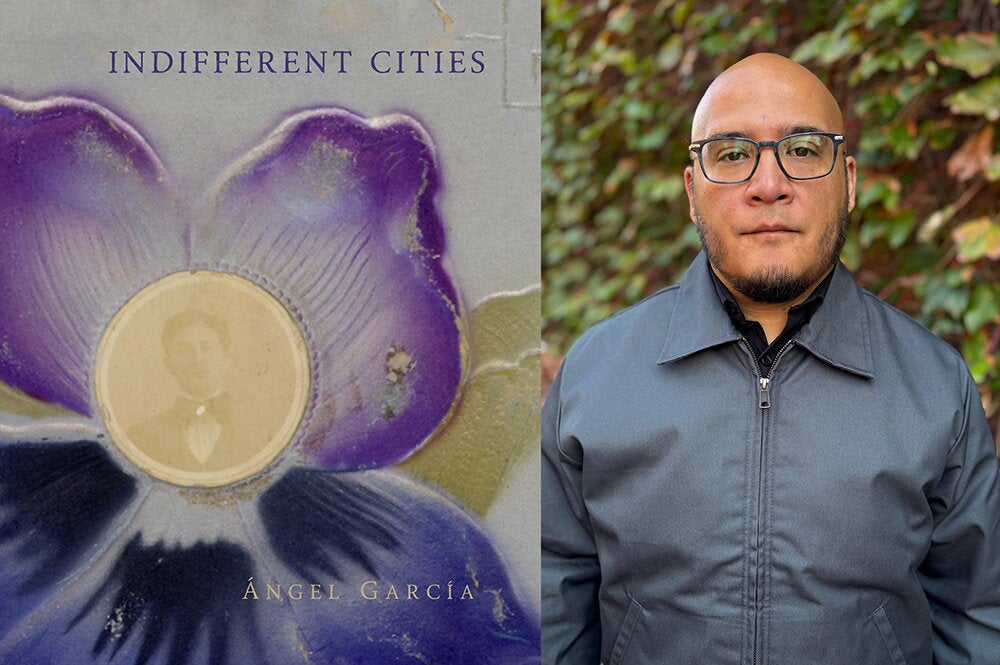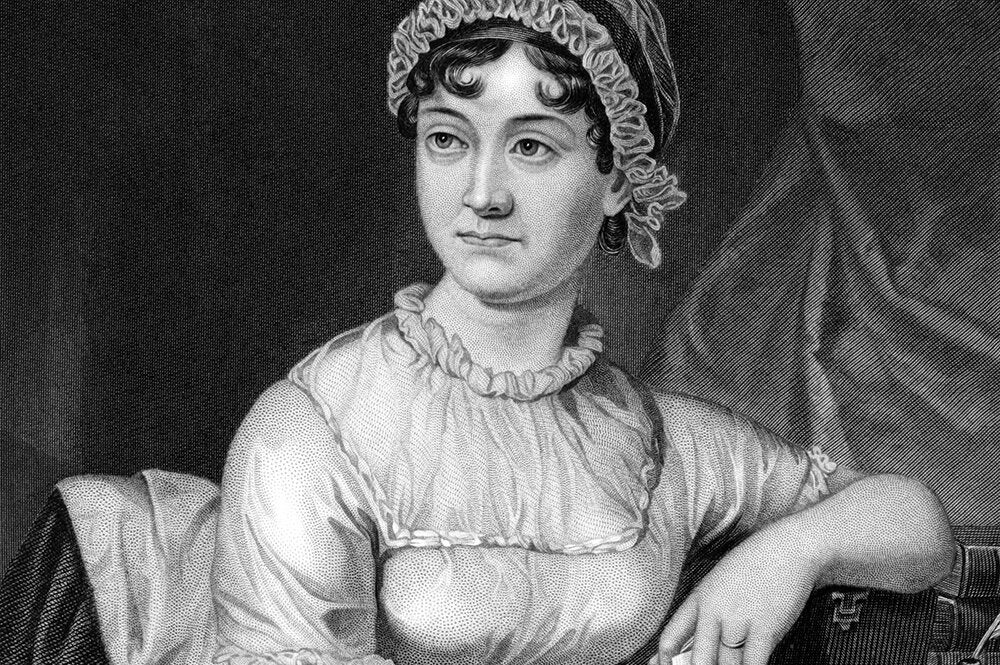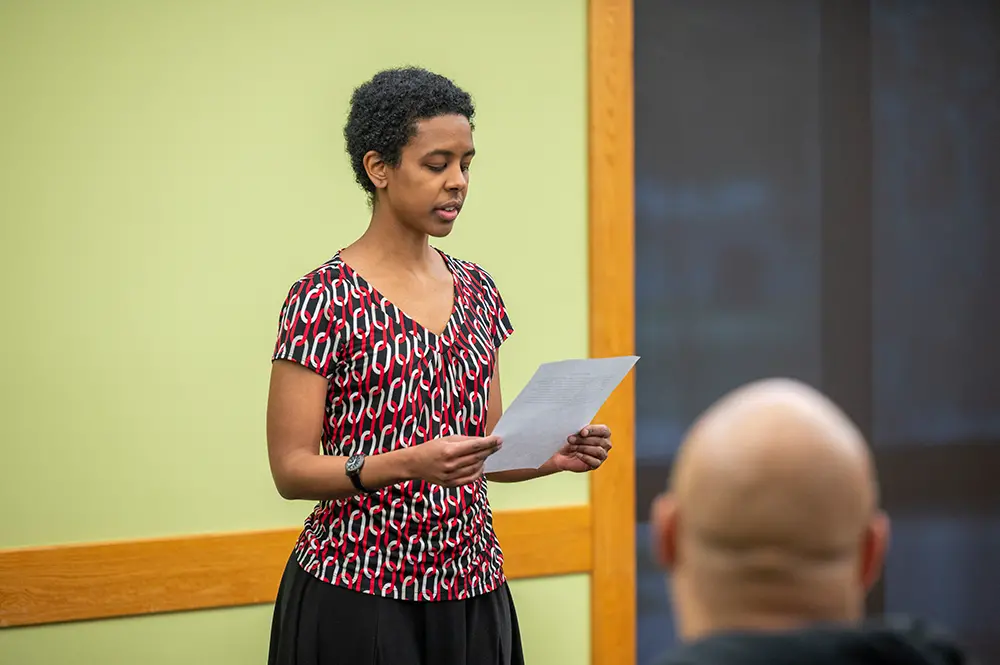
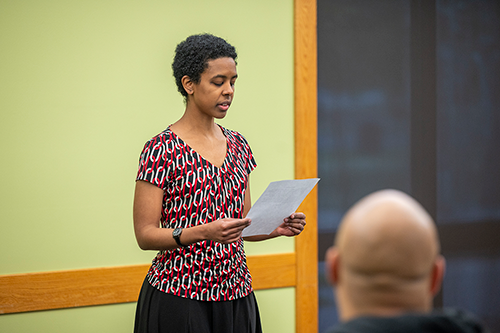
Being the first to read her poem, Sarah Demissie approached the stage at the library hesitantly, scanning the crowd nervously. Her confidence grew as she began to read aloud, however, and she ended by boldly cheering her poem’s last line—"Home sweet home!”—and pumping her fist in the air. The room filled with applause.
Demissie was a student in the final day of “Writing for Discovery: Self, Public, and Community,” a new pilot summer course offered through the Odyssey Project, a free college program at the University of Illinois Urbana-Champaign offered to adults in the community who might not otherwise afford college.
The course was taught by Ángel García, professor of English at the U of I. García, a poet and author of award-winning “Teeth Never Sleep,” said he accepted an invitation to teach the course because he was interested in making more direct connections to the community. “This class allowed me to meet community members where they live and work,” he said.
“A program like this builds opportunity in the community and allows people who might otherwise not have had the opportunity to learn and teach,” García said. “As a university professor, there are not many other opportunities I’ve had to work with non-traditional students, and it was truly a blessing to learn from the students.”
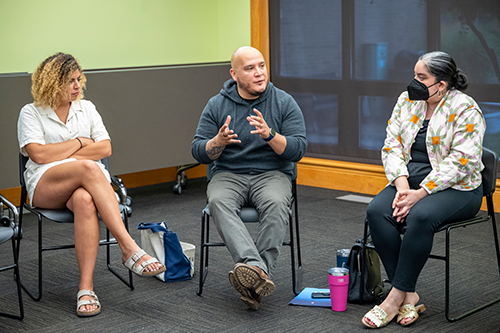
Alaina Pincus, assistant director for education and outreach at the Humanities Research Institute, which runs the Odyssey Project with support from the College of LAS, said the program is ultimately about the Champaign-Urbana community itself and “improving the lives of members of the community and giving them the opportunity to take education into their future lives and whatever they want to do.”
The course gave students space to explore issues relevant to their lived experience in Champaign-Urbana and surrounding communities. Through their writing, students refined their understanding of how local issues affect them and expressed their ideas to private and public audiences.
Students learned about multiple genres of creative writing and various forms, such as poetry, fiction, and creative non-fiction meant to develop an understanding of the relationship between form and content. They read a variety of poems from poets such as Lucille Clifton, Danez Smith, José Olivares, Casandra López, as well as University of Illinois’ Janice Harrington, and more. They also read several non-fiction essays by Dick Gregory, Brent Staples, Judith Ortiz Cofer, and Chang-Rae Lee.
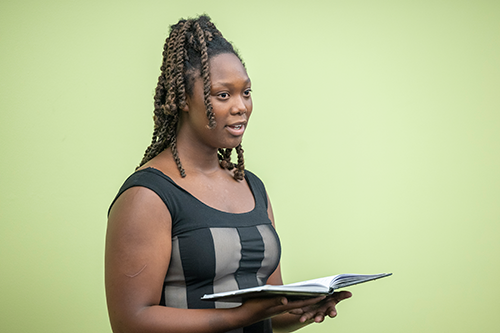
“We taught each other different ways to improve our reading and writing skills, on how to improve our stories with as much detail as possible, and what stories we learned and took away from each other through writing and discussing,” Demissie said.
The course concluded with a public poetry reading by the students at the Douglass branch of the Champaign Public Library. Community members gathered to hear the poems and were invited afterward to engage in a discussion about poetry, the writing process, and community. Participants were able to exchange ideas, share personal experiences, and bond over poetry’s power to share one’s truth and create a connection with the listener.
Demissie’s poem was a description of her home through sensory observations of her neighborhood and nature. She chose to share “Home Sweet Home” to express her personal experiences, and she said afterward during discussion that connecting through poetry shows people they are not alone and that writing can be an important way to share our lives with others.
“I chose to take the workshop because I wanted to discover how good I was at expressing my creativity through my reading and writing skills,” Demissie said, later. “It was an opportunity for me to learn how to increase my communication skills through creative reading and writing and also gain some knowledge and experience doing the public reading presentation.”
The four-week workshop, which ran from mid-June to early July, was created as part of Odyssey’s efforts to expand course offerings.
“We explored a number aspects of what Odyssey students want and need,” said Pincus, “as well as took into account other factors like Odyssey's most important outcomes, what other community-based educational resources exist in Champaign-Urbana, the timeline for getting a new course approved by LAS, the university's commitment to public engagement, and our own identity as a community-serving program. We decided that a short-term creative writing workshop that engages participants in writing about their communities would serve the majority of our needs.”
García said students learned that writing can build bridges and affect change in their community.
“By sharing their own stories students can make connections with readers and those readers in turn, might feel for the first time that they are able to survive and thrive,” he said.
García added that he thoroughly enjoyed teaching the Odyssey class, and that they were able to connect quickly over our shared experiences of the assigned readings and conversations about their lives.
“What I loved about working with the Odyssey students was their ability to relate to the texts and jump into conversations,” he said. “They weren’t afraid of sharing their reactions and the ways in which they related to the texts personally and politically.”
